Related Research Articles
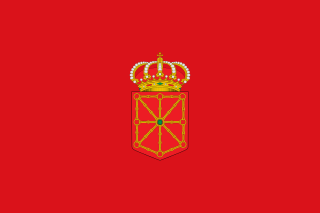
Navarre, officially the Chartered Community of Navarre, is an autonomous community and province in northern Spain, bordering the Basque Autonomous Community, La Rioja, and Aragon in Spain and Nouvelle-Aquitaine in France. The capital city is Pamplona.

Álava or Araba, officially Araba/Álava, is a province of Spain and a historical territory of the Basque Country, heir of the ancient Lordship of Álava, former medieval Catholic bishopric and now Latin titular see.

Castile and León is an autonomous community in north-western Spain.

The Province of Burgos is a province of northern Spain, in the northeastern part of the autonomous community of Castile and León. It is bordered by the provinces of Palencia, Cantabria, Vizcaya, Álava, La Rioja, Soria, Segovia, and Valladolid. Its capital is the city of Burgos.
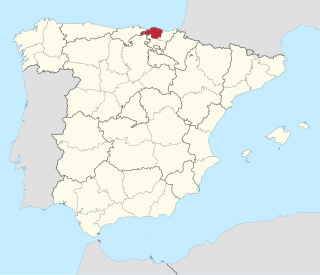
Biscay is a province of Spain, lying on the south shore of the eponymous bay. The name also refers to a historical territory of the Basque Country, heir of the ancient Lordship of Biscay. Its capital city is Bilbao. It is one of the most prosperous and important provinces of Spain as a result of the massive industrialization in the last years of the 19th century and first half of the 20th century. Since the deep deindustrialization of the 1970s, the economy has come to rely more on the services sector.

The Kingdom of Navarre, originally the Kingdom of Pamplona, was a Basque kingdom that occupied lands on either side of the western Pyrenees, alongside the Atlantic Ocean between present-day Spain and France.

The Autrigones were a pre-Roman tribe that settled in the north of the Iberian Peninsula, in what today is the western Basque Country and northern Burgos and the East of Cantabria, Spain. Their territory limited with the Cantabri territory at west, the Caristii at east, the Berones at the southeast and the Turmodigi at the south. It is discussed whether the Autrigones were Celts, theory supported by the existence of toponyms of Celtic origin, such as Uxama Barca and other with -briga endings and that eventually underwent a Basquisation along with other neighboring tribes such as the Caristii and Varduli

Miranda de Ebro is a city on the Ebro river in the province of Burgos in the autonomous community of Castile and León, Spain. It is located in the north-eastern part of the province, on the border with the province of Álava and the autonomous community of La Rioja. According to the 2008 census conducted by Spain's National Institute of Statistics, it has a population of 39,589 inhabitants, making it the second most populous city in the province after the capital, Burgos.
El Correo is a leading daily newspaper in Bilbao and the Basque Country of northern Spain. It is among best-selling general interest newspapers in Spain.

Briviesca is a municipality and a Spanish city located in the north of the Iberian Peninsula, head of the judicial district of Briviesca, capital of the region of La Bureba and province of Burgos, autonomous community of Castilla y León. According to the demographic data of 2017, the municipality has 6,861 inhabitants, being the 4th most populated in the province. The municipality of Briviesca is made up of five towns: Briviesca, Cameno, Quintanillabón, Revillagodos and Valdazo.

Condado de Treviño is a municipality in the province of Burgos, autonomous community of Castile and León, Spain. This municipality and the geographically smaller La Puebla de Arganzón make up the enclave of Treviño. Although the enclave is part of Burgos it is surrounded by the province of Álava, part of the autonomous community of the Basque Country.
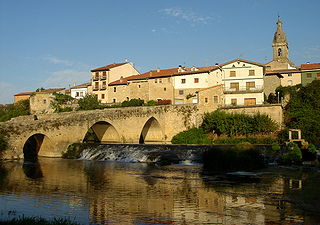
La Puebla de Arganzón ; is a municipality located in the province of Burgos, Castile and León, Spain. It is in the Comarca del Ebro and the legal district Miranda de Ebro. According to the INE, the municipality had a population of 529 inhabitants in 2009.
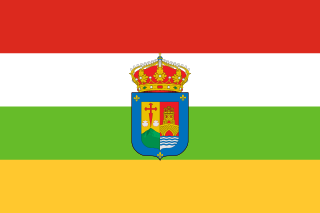
La Rioja is an autonomous community and a province in Spain, located in the north of the Iberian Peninsula. Its capital is Logroño. Other cities and towns in the province include Calahorra, Arnedo, Alfaro, Haro, Santo Domingo de la Calzada, and Nájera. It has an estimated population of 315,675 inhabitants, making it the least populated region of Spain.
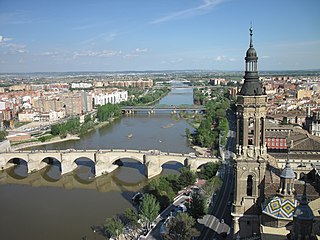
The Ebro is a river on the Iberian Peninsula. It is the second longest river in the Iberian peninsula after the Tagus, second biggest by discharge volume and by drainage area after the Douro, and longest river running entirely within Spain.

The 1833 territorial division of Spain divided Spain into provinces, classified into "historic regions". Many of these regions correspond to present-day autonomous communities of Spain and nearly all of the provinces retain roughly or precisely these borders, although five provinces have changed their names to reflect local languages other than Castilian Spanish and three to match the name of a coterminous autonomous community.

The Treviño Enclave in northern Spain is part of the territory of the province of Burgos, but is completely surrounded by the territory of the Basque Country province of Álava. Thus, it is an enclave of the Basque Country and an exclave of Castile and León. It consists of two municipalities—Condado de Treviño and La Puebla de Arganzón—and is part of the legal district of Miranda de Ebro in the province of Burgos.

The Zadorra is a river tributary of the Ebro in the Basque Country at the north of the Iberian Peninsula. The river flows across province Álava all along till it pours into the Ebro near Miranda de Ebro in Burgos' lands. The river's water volume is the largest in Álava, with its basin being the most extensive in the province. Nowadays it provides by means of the Zadorra Reservoir System water supply for Vitoria and half of the Basque Autonomous Community.

The conflict over the Treviño enclave is a territorial dispute in northern Spain between the administration of the Province of Burgos and Castile and León on the one side, and those of Álava and the Basque Country on the other, over the administration of the territory. The conflict does not only involve territorial questions, but also extends to political and language issues, as well as questions about provision of services and transport connections.

Eusko Alkartasuna is a Basque nationalist and social-democratic political party operating in Spain and France. The Basque language name means Basque Solidarity and abbreviated as EA. The party describes itself as a "Basque nationalist, democratic, popular, progressive and non-denominational party". Recently, the party adopted the slogan "Euskal Sozialdemokrazia".

The 1983 Spanish local elections were held on Sunday, 8 May 1983, to elect all 67,505 councillors in the 7,781 municipalities of Spain and all 1,024 seats in 38 provincial deputations. The elections were held simultaneously with regional elections in thirteen autonomous communities, as well as local elections in the three foral deputations of the Basque Country and the ten island councils in the Balearic and Canary Islands.
References
- ↑ "IU rompe con Ganemos e inicia el proceso para buscar su candidato | Noticias Diario de Burgos". diariodeburgos.es. Retrieved 2020-05-13.